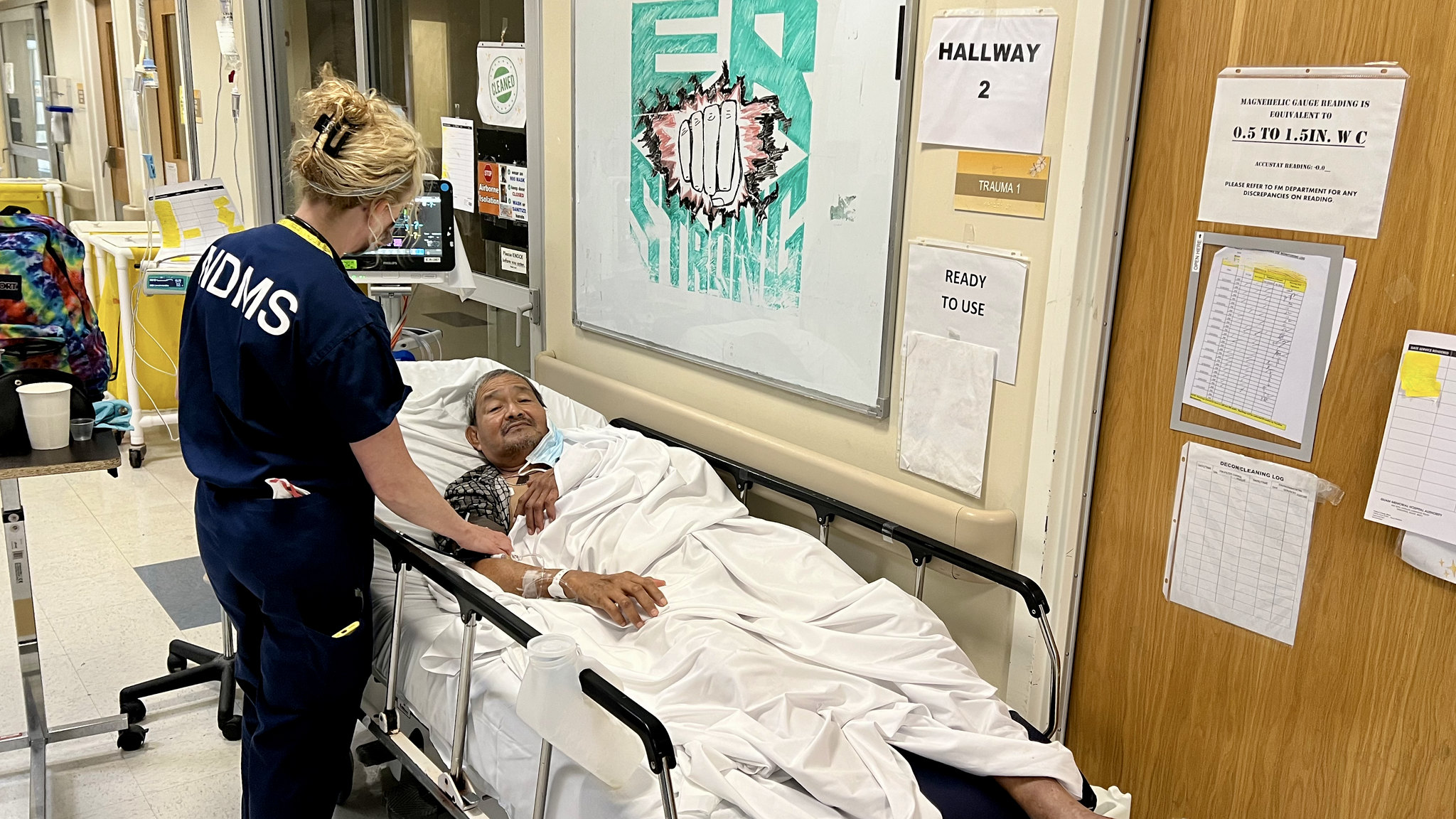The mission of the Administration for Strategic Preparedness and Response (ASPR) is to assist the country in preparing for, responding to, and recovering from public health emergencies and disasters. At-risk individuals and underserved communities are more likely to experience more severe and prolonged impacts than other communities. To be prepared for and able to respond to and recover from emergencies, every person in each community must be accounted for in our national resilience efforts.
Health equity is at the core of
ASPR’s Strategic Plan. The plan builds on the Biden-Harris Administration’s commitment to advance racial equity and support underserved communities through the federal government, as described in Executive Orders
13985 and
14091.
Healthy People 2030 defines health equity as the attainment of the highest level of health for all people. Achieving health equity requires valuing everyone equally with focused and ongoing societal efforts to address avoidable inequalities, historical and contemporary injustices, and the elimination of health and health care disparities.
ASPR’s health equity goal is to improve equitable access to and delivery of ASPR services to all members of our communities by making health equity integral to ASPR’s organizational readiness and external preparedness, response, and recovery activities. Each of ASPR’s offices has a role in achieving that health equity goal. ASPR’s offices, and the programs they oversee, are advised by an internal Diversity, Equity, and Inclusion Leadership Council and Climate and Equity Policy Hub on how to integrate health equity into ASPR’s policies and operations.
- Identifies opportunities to help healthcare partners nationwide advance health equity through the
Hospital Preparedness Program cooperative agreements.
Impact: Improves the capacity of health care systems in all 50 states, 8 territories, freely associated states, and four metropolitan areas to plan for and respond to large-scale public health emergencies and disasters increasing community resilience nationwide.
- Awards $50 million in grants to
Medical Reserve Corps (MRC) units across the country to support community emergency preparedness and response activities.
Impact: Provides funding to the MRC network in 33 states and jurisdictions to strengthen emergency preparedness and response with a focus on addressing health equity. This includes the establishment of new MRC units in tribal jurisdictions that can address the unique needs of the diverse communities and at-risk populations they serve.
- Utilizes the
emPOWER Program to provide data, mapping, tools, training, and resources to help communities nationwide protect the health of at-risk Medicare beneficiaries prior to, during and after public health emergencies and disasters.
Impact: Allows communities across the nation access to data and tools to protect the health of 4.5 million individuals who live independently and rely on electricity-dependent durable medical and assistive equipment and devices.
- Oversees the three
national advisory committees that provide recommendations to ASPR and HHS on meeting the unique needs of seniors, children, and people with disabilities during disasters and public health emergencies.
Impact: Drives change across the nation by identifying the unique needs of children, older adults, and individuals with disabilities who are affected by a public health emergency or disaster.
- Provides technical assistance to healthcare, public health, and emergency management professionals to enhance health equity through ASPR’s Technical Assistance, Assistance Center, and Information Exchange (ASPR TRACIE). ASPR TRACIE has developed peer-reviewed resources to help professionals address healthcare disparities, the needs of individuals with access and functional needs, and issues in providing support to the LGBTQIA+ community during and after disasters.
Impact: There have been more than 2 million website visits to ASPR TRACIE since its inception in 2015 and developed more than 500 resources geared towards supporting health care and public health stakeholders who serve diverse communities across the nation.

- Works with state, local, tribal, and territory partners to help ensure their response and recovery plans address their most at-risk populations.
Impact: ASPR developed the
Equitable Disaster Recovery Assessment Guide & Checklist: Advancing Equity in Post-Disaster Recovery Operations to help partners create or implement disaster recovery plans with whole-of-community approaches.
- Activates the
Emergency Prescription Assistance Program to pay for certain prescription medications and durable medical equipment lost or damaged in disasters for uninsured residents in designated disaster areas.
Impact: Helps improve access to prescription medications; vaccinations; certain medical supplies; and some forms of medical equipment, including canes, walkers, wheelchairs, and crutches for people who are uninsured.
- Deploys federal responders who can deliver culturally and linguistically competent services during ASPR’s response and recovery missions.
Impact: Advances language access, health literacy, and culturally tailored health care services to individuals affected by a public health emergency or disaster.

- Works with industry partners to develop low-cost, high-performance medical countermeasures and digital public health guidance tools that can be used to enhance the quality of care in resource-limited healthcare settings.
Impact: Makes vaccines, treatments, tests, and related technology that can be made widely accessible to individuals in communities across the country. Products could be used at-home or made available at pharmacies or in low-resource settings.
- Ensures the diversity of clinical trial volunteer participants in BARDA-funded studies reflects the growing diversity within the United States.
Impact: Vaccines, treatments, and tests are evaluated in the way that they would be used in real-world circumstances to maximize product acceptance and effectiveness regardless of age, gender, race, or underlying health conditions.
-
BARDA’s Accelerator Network provides funding opportunities to socially and economically disadvantaged startups developing innovative technologies to improve our nation’s health security.
Impact: Increases access to business and scientific experts as well as funding opportunities to help ensure diverse perspectives and innovative solutions are developed to improve our nation’s health security.
- Partnered with the U.S. Postal Service for ordering and delivery of at-home COVID-19 tests.
Impact: Working together, ASPR and USPS purchased tests and created an ordering website to deliver more than half a billion at-home COVID-19 tests to American households across the country.
- Partnered with Indian Health Service, the Health Resources and Services Administration (HRSA)-and Housing and Urban Development to provide free COVID-19 tests for American Indian and Alaska Native communities, Section 202 housing (HUD), HRSA-funded health centers, rural health clinics, food banks, long-term care facilities, and other sites serving at-risk communities.
Impact: Approximately 4 million COVID-19 tests were delivered each week to easy-to-access locations nationwide, reaching low-income Americans, seniors, people who are blind or have low vision, and other vulnerable patients.

- Worked with federal retail pharmacy partners to establish a network of over 100,000 vaccination sites and 45,000 access points for therapeutics during the COVID-19 Pandemic.
Impact: 90% of Americans lived within 5 miles of a location where they could receive a COVID-19 vaccine, resulting in over 81% of the U.S. population choosing to receive at least one dose of vaccine.
- Works with Pfizer to implement the U.S. Government Patient Assistance Program to provide Paxlovid at no cost to patients with public insurance, such as Medicare or Medicaid, through 2024, and for uninsured patients through 2028 or until the U.S. government supply is depleted.
Impact: Provides Paxlovid at no cost to tens of millions of patients with public insurance to ensure continued access after Paxlovid’s transition to commercial distribution. The program builds on the COVID-19 treatment program for vulnerable Americans in place from November 2021 through December 2023. During that time, ASPR distributed nearly 30 million COVID-19 treatment courses, including monoclonal antibody, intravenous (IV), and oral antiviral medicines to keep high-risk patients out of the hospital and prevent death from COVID-19.
- Ensures American Indian and Alaska Native communities and underserved communities have equal access to COVID-19 treatments through programs such as the Indian Health Service and Health Resources and Service Administration-funded centers.
Impact: Provides free at-home COVID-19 treatments, Paxlovid or Lagevrio, from the U.S. government inventory for patients who rely on healthcare services at Indian Health Service centers and HRSA-funded health centers.
- Developed an online locator tool for COVID-19 Test-to-Treat sites.
Impact: Enabled access to thousands of locations across the country where Americans could get tested for COVID-19 and then, if appropriate, receive a prescription for COVID-19 at-home treatment and fill the prescription for free, all at the same store.
-
Leading a strategy that will facilitate direct access to SNS resources for federally recognized tribal governments, Indian Health Service (IHS) health care providers, tribal health authorities, and Urban Indian Organizations (UIOs) during a pandemic or other large-scale public health emergency.
Impact: Will expand and refine processes through which IHS, tribal, and UIO providers can directly request federal assistance to locate medical supplies and PPE, ensuring more equitable access to the life-saving resources of the SNS during a fast-moving public health emergency response.

